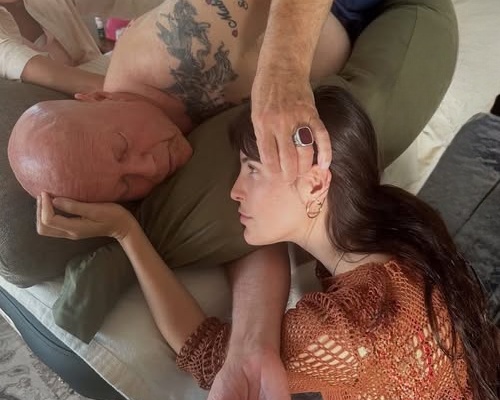Bruce Willis, the Hollywood icon known for his unforgettable roles in Die Hard, Armageddon, and The Fifth Element, now faces one of life’s most deeply personal battles. Far from the explosions, stunts, and sharp-tongued humor that made him a global star, he is now contending with frontotemporal dementia (FTD), a progressive neurological disease that affects behavior, language, and movement. For countless fans who grew up watching him on screen, this revelation has sparked empathy and contemplation. For his family, it has become a journey defined by love, resilience, and unbreakable solidarity.
For more than forty years, Bruce Willis enthralled audiences with a rare combination of strength, wit, and emotional vulnerability. He mastered the art of balancing intense action with genuine human depth—making him one of the most accessible and beloved heroes of his era. Viewers admired how he could transform an implausible scenario into something that felt real, infusing each scene with warmth, sincerity, and a touch of self-aware humor. Yet behind the curtain, Willis’s life has shifted dramatically. According to honest updates from his loved ones, FTD has severely disrupted his capacity to communicate and to manage everyday tasks on his own. This transformation has been heartbreaking—not only for him, but also for the people who love him, who now surround him with steadfast patience, courage, and care.
Emma Heming Willis, his wife, has spoken candidly about what it means to watch someone you cherish struggle with such an unforgiving condition. In a deeply moving interview, she revealed, “Some days we catch glimpses of him—his smile, his warmth—and on other days, it feels like the disease has taken more. Watching the strongest person you know lose parts of themselves is heartbreaking.” Her words reflect not only the profound love she holds for her husband, but also the pain, strength, and resilience shared by caregivers everywhere who confront similar trials.
Frontotemporal dementia differs from Alzheimer’s disease in that it often appears earlier, typically between the ages of forty and sixty-five. The disease primarily targets the frontal and temporal lobes of the brain—the regions responsible for behavior, emotional regulation, and language expression. Early symptoms may appear mild, such as subtle changes in personality or difficulty finding the right words, but the progression is often swift and unforgiving. Neurologist Dr. Susan Chang explains, “FTD is heartbreaking because it doesn’t just take away memories—it takes away the person’s essence. Families experience loss twice—first when personality fades, and again as the disease advances.” The Willis family’s openness about their reality has played a vital role in raising awareness about a condition still little understood by many.
To grasp the gravity of this moment, it helps to revisit who Bruce Willis has always been. Born in Germany in 1955 and raised in New Jersey, he discovered an early passion for performance. He first captured attention in the 1980s television series Moonlighting, where his quick wit and magnetic charm made him a breakout star. But his true ascendancy began with Die Hard, where his portrayal of NYPD officer John McClane redefined what an action hero could be. McClane wasn’t infallible—he got injured, cracked jokes while in pain, and kept fighting. This fallible, human version of heroism became Bruce’s signature, earning him fans across generations and cementing his place in film history.
But behind all the blockbuster action and Hollywood glory, family was always his greatest role. Even amid jam-packed shooting schedules and international fame, Bruce remained devoted to his loved ones. And now, that same family is standing by him with unwavering commitment. Emma Heming Willis, his wife since 2009, has embraced the responsibilities of a full-time caregiver, openly sharing both the challenges and the joys that arise on this journey. His daughters—Rumer, Scout, and Tallulah from his first marriage to Demi Moore, along with Mabel and Evelyn with Emma—have also rallied with incredible cohesion. Even Demi Moore herself has stayed close, spending time with the family and offering heartfelt support. Together, they have formed a circle of love that defies the stereotypes of Hollywood, demonstrating what true connection looks like in the face of adversity.
These shared moments of closeness now carry even greater meaning. Although Bruce’s capacity to speak becomes more limited, his familiar smile still breaks through—bringing comfort, hope, and connection. Family members describe those smiles as “small miracles,” precious sparks revealing the man they have always known. Friends observe that although he may be quieter, his core strength remains intact, touching those around him. Fans across the globe continue sending messages of encouragement and gratitude, reminding the family—and the world—that Bruce’s influence extends far beyond the silver screen.
By speaking openly about his illness, the Willis family has also elevated global awareness of FTD, encouraging understanding, compassion, and support. Through sharing their personal experience, they have transformed private suffering into public purpose—offering solace to families navigating a similar path. Emma has emerged as a voice for caregivers everywhere, underscoring how vital support and community are in this role. “It’s easy to lose yourself when you’re caring for someone you love,” she said. “Caregivers need help, too. None of us can walk this road alone.” Her candor has resonated deeply, bringing attention to a role often carried quietly and without recognition.
Though Bruce Willis’s acting career has come to an end because of his illness, his legacy remains immutable. He changed the way audiences viewed action stars, proving that strength and humor could coexist with tenderness and vulnerability. His performances in The Sixth Sense, Pulp Fiction, and Unbreakable revealed emotional layers few could match. Yet more enduring than his film credits are the defining traits of Bruce Willis: humility, kindness, and profound devotion to his family. These qualities—not explosions or catchphrases—are the foundation of a legacy destined to endure long beyond the final credits roll.
As the Willis family continues on their journey, one truth remains constant: they choose love above all else. Emma expressed this beautifully: “We don’t know how much time we have, but we know we’ll fill it with love. That’s all that matters.” Her words capture the spirit of a remarkable family—a family facing loss not with despair, but with courage, compassion, and unity.
Bruce Willis built his career by portraying heroes who fought impossible battles and drew strength from struggle. Now, in real life, he lives that same truth. His current fight isn’t waged with fists or firepower—but with faith, resilience, and love. In doing so, he offers a powerful reminder: even the strongest heroes are human—and the greatest power of all is the bond that holds a family together.



